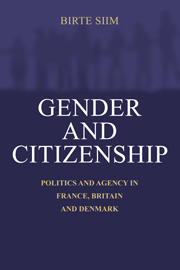Book contents
- Frontmatter
- Contents
- List of Tables and Figures
- Preface
- Abbreviations
- Introduction: Feminist Rethinking of Citizenship
- 1 Towards a Gender-sensitive Framework of Citizenship
- 2 Theories about Citizenship
- 3 Feminist Approaches to Citizenship
- 4 Gender and Citizenship: The French Case
- 5 Gender and Citizenship: The British Case
- 6 Gender and Citizenship: The Danish Case
- Conclusion: Towards a Contextualised Feminist Theory of Citizenship
- Appendix
- Notes
- Bibliography
- Index
5 - Gender and Citizenship: The British Case
Published online by Cambridge University Press: 05 November 2011
- Frontmatter
- Contents
- List of Tables and Figures
- Preface
- Abbreviations
- Introduction: Feminist Rethinking of Citizenship
- 1 Towards a Gender-sensitive Framework of Citizenship
- 2 Theories about Citizenship
- 3 Feminist Approaches to Citizenship
- 4 Gender and Citizenship: The French Case
- 5 Gender and Citizenship: The British Case
- 6 Gender and Citizenship: The Danish Case
- Conclusion: Towards a Contextualised Feminist Theory of Citizenship
- Appendix
- Notes
- Bibliography
- Index
Summary
Assumptions about Gender in Liberal Discourse
In this chapter I analyse the logic of the exclusion and inclusion of women in citizenship in Britain. What has been the perception of women's civil, political and social rights, and how has women's agency influenced the formulation of social policies? I explore the changing nature of gender and citizenship in the crucial periods of welfare state developments, and look at the changes in the discourse of citizenship in periods when gender and citizenship has been an issue in political discourse and social policy. The focus is on the shifts in the discourses and politics of gender and citizenship and on the changing role of women's agency. The research interest is to understand the political meaning of gender in contemporary debates about citizenship.
Britain has a unique status in the development of the framework of citizenship because T. H. Marshall's paradigmatic model of citizenship was based on the political development of Britain and the integration of the British working class. Marshall (1992: 10) described the gradual evolution of civil, political and social rights, and he stressed that the three elements of citizenship were originally blended, later to be divorced. He traced the formative period of each aspect of citizenship to a different century. The 18th century was the period for civil rights, the 19th century for political rights, and the 20th century for social rights.
- Type
- Chapter
- Information
- Gender and CitizenshipPolitics and Agency in France, Britain and Denmark, pp. 79 - 107Publisher: Cambridge University PressPrint publication year: 2000

